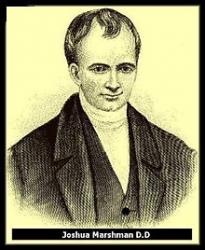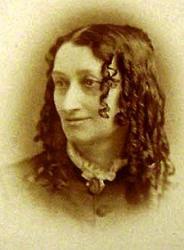
1768 - 1837 Hymnal Number: d687 Author of "O thou, my soul, forget no more" in Calvary Selection of Spiritual Songs with Music for the Church and the Choir Marshman, Joshua, D.D., was born at Westbury Leigh, Wiltshire, April 20, 1768, and educated for the Baptist ministry at the College at Bristol. In Oct. 1799 he joined Dr. Carey at Serampore, India. In 1826 he visited England, and returned to India in 1829. He died at Serampore, Dec. 5, 1837. His translation of Krishnu Pal's hymn is noted at p, 633, ii. In his Baptist Hymn Writers, Portland, U.S.A., Dr. Burrage attributes the original hymn, “Hail, precious book divine" (Holy Scripture) to him, but leaves its date and place of publication unnoted.
--John Julian, Dictionary of Hymnology, Appendix, Part II (1907)
====================
In early life he evinced a fondness for books and study. In 1794, he accepted the charge of a school connected with the Broadmead Baptist church, Bristol, and not long after he was baptized, and united with the church. At the same time he entered the theological seminary at Bristol, and devoted himself to the Hebrew, Syriac, and other languages. Becoming interested in Dr. Carey’s work in India, he and his wife, in 1799, offered themselves for missionary service, and sailed May 29, for India. They landed at Serampore October 13, and the mission was established there, Dr. and Mrs. Marshman opening a boarding-school to aid them in the prosecution of their work. In 1806, Dr. Marshman commenced the study of the Chinese language for the purpose of translating the Scriptures into that tongue. In 1814, he published his “Key to the Chinese Language,” and in fifteen years from the time he commenced his study of the language he completed the publication of the first portion of the Scriptures in the Chinese language, consisting of the book of Genesis, the four Gospels, and Paul’s Epistles to the Romans and Corinthians. In 1826, he visited England, and returned in India in 1829…In 1811, Brown University conferred upon him the honorary degree of Doctor of Divinity.
Marshman’s works include:
Dissertation on the Characters and Sounds of the Chinese Language, 1809
The Works of Confucius, Containing the Original Text, with a Translation, 1811
A Defence of the Deity and Atonement of Jesus Christ, 1822
Sanskrit Grammar, with Henry Carey
Bengalee and English Dictionary, with Henry Carey
http://www.hymntime.com/tch/bio/m/a/r/s/marshman_j.htm
=================
http://en.wikipedia.org/wiki/Joshua_Marshman
Joshua Marshman


 My Starred Hymns
My Starred Hymns




